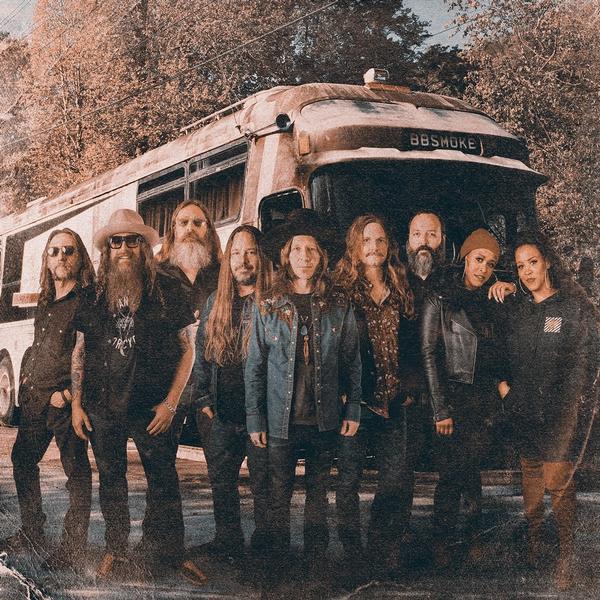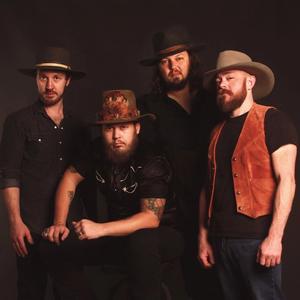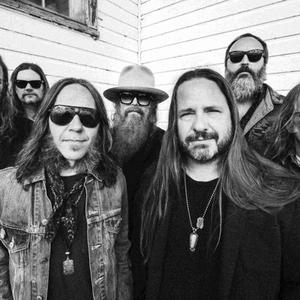




Link copied

Charlie Starr has always been a proud native of the Peach State. The frontman of the iconic Georgia rock’n’roll group Blackberry Smoke puts the love for his home at the center of You Hear Georgia, the band’s eighth studio record that celebrates their 20th anniversary together.
The effort sees the band exploring their contrasting rock and honky-tonk stylings with an all-star cast of guests, including Warren Haynes (who co-wrote and features on ‘All Rise Again’), Jamey Johnson (on the country-inspired ‘Lonesome For A Livin’) and the Black Bettys (background vocals throughout the album). Despite the ongoing pandemic, the album was recorded in person at the famed RCA Studio A in Nashville. Starr joked that, due to the band’s rapport with one another and the power of modern technology, they “could make a record and not have to be anywhere near each other if we wanted - but that would be pretty lame.”
The compilation proves that even after two decades as a band, Blackberry Smoke show no signs of slowing down – even at the tail end of a pandemic that sidelined the group, threatening the financial viability of all the members and their families. Speaking from his Atlanta home, Charlie Starr talks about pandemic-related struggles, cultural misconceptions highlighted within You Hear Georgia and how he makes sense of genre classifications.

I know you’ve been writing a lot during the pandemic, but are there any other interests you’ve returned to or hobbies you’ve picked up during the time away from touring?
I planted a garden in the backyard of my family’s Atlanta home and put up a whole fence by myself, which was incredibly therapeutic. The time with my family has been great as well. I’ve gotten to do things with my son that I normally wouldn’t get to because I’d be on tour. We did a lot of camping in the North Georgia mountains last summer; with everything going on it was nice to get out of the city and into the woods for a bit. The time was bittersweet though, because I had been away from earning a living for a long time. That being said, we’ve been getting back to playing some shows lately. It feels really good.
Were most of the songs from You Hear Georgia written during the pandemic or prior?
I would say about half. ‘You Hear Georgia’ was the last song written. We were in the studio finishing up tracking, and I was on the couch and was playing with the idea - it was just a guitar riff and a couple of lines - when Dave Cobb walked by and said, “What's that?” And I said, “It's not finished yet. It's just an idea.” After I finished it, he fell in love with it and said we had to record it, so that was the last song that we laid down for the album. It's really exciting when things that are very spontaneous like that happen.
It’s crazy to think that this was your first time as a band getting into the studio with Dave Cobb; the result was well worth the wait. What did it mean to you to get to team up with another highly regarded Georgian for the album?
Well, it was great. We wanted to make a record with him for quite a few years just because of the work that he does. It speaks for itself. He makes great records and people always talk of “The Dave Cobb Sound”, but he’s always had the approach of making you sound like you, not anyone else. He and I have spoken over the last few years and tried to make a record, but it’s been difficult to schedule because he’s extremely busy. At the end of 2019, we committed to recording with him in March 2020, and we all know what happened in March. We had to push back the sessions a few more times, before finally getting in to record with him in late May and early June.
I love the sentiment behind the song ‘You Hear Georgia’. Those opening lines (“You hear Georgia when I open my mouth / Don’t make no difference what I’m talking about”) really resonate with me. As someone born and raised in Kentucky, I see many of the preconceptions outsiders have of Georgians that are often placed on the people here as well. Did the song’s message stem from any particular experience you’ve had, or was it due to a build-up of encounters over time?
Well, for those two opening lines, I was sitting at home one morning during lockdown, drinking a cup of coffee with the news on. There was a guy being interviewed who had a very, very thick Southern accent. They were talking about something really important and it made me grin. I began to think, “I wonder if people actually hear what he's saying, or if they just hear how he’s saying it”. He was by no means a hillbilly, he just had a thick Southern accent. That's what inspired the beginning of the song, but the idea just kind of grew after that into asking, “Isn't this fight old to people now?” Not even specifically the fight about where you come from or how you speak, but just fighting in general. That then expanded further into showing love for where I come from, the people that I grew up around and the music that I was shown from a young age - whether it be bluegrass, soul, rock’n’roll or Georgian artists like Little Richard, Otis Redding, The Georgia Satellites, The Black Crowes, Drivin N Cryin, and R.E.M. It's all so beautiful. If you focus on what's beautiful, I think more beauty grows from that.
Another song I’ve really enjoyed from the new album is ‘Old Scarecrow’. The person you describe in it reminds me a lot of some of my older family members — stubborn, hard-working and full of stories and knowledge. Is there anyone in particular in your life that you shaped the song’s main character after?
That song is about an old man who is exactly what you just described - he's been through it all. I look at him as a guy who maybe lived through the Great Depression or World War II and saw lots of horrific things. In the song he’s taking a step back and looking at what's happened during his lifetime. Then he comes back to reality, where there’s social media and everybody is full of opinions, and he's not having it. So he says, “Just let me be alone to live my life”. It's a composite of a guy who's worked hard all his life, is close to the land and is not worried about what's going on on TikTok. The more I think about it, the more I guess it could all stem from my own father. He is a very religious, loving and hard-working man. He served in the Army during the Vietnam War, has always had a garden and has never really cared much to leave his home. He's a homebody. He really taught me the important things in life; right from wrong and to not look down or judge others before looking at yourself. He was a good father, still is. He's not on social media and not terribly concerned about what's trendy. He just lives his life, reads his Bible and does his thing.
We’ve had an ongoing debate at Holler recently about what defines Americana music. Given that Blackberry Smoke frequently chart on country and Americana radio, I was curious to see if you had any thoughts on the matter?
That’s always been a tough thing for me to nail down. I always think, would you call Hank Williams a country singer or an Americana singer? As far as people labelling specific types of music, things change as time goes by. It’s not as simple now as it once was. I’ve always considered us a rock'n'roll band, but all of us also love country music, string bands, folk songs, funk, reggae, jazz - you name it. This is a stab in the dark, but maybe what we call country now is what you hear on mainstream country radio, which are mostly songs about partying, drinking, girls and pick-up trucks. Maybe now that’s what country is, and Americana is artists like John Prine and others who write about everyday people and life in a more introspective way.
That’s how I look at it as well. It’s not inaccessible by any means, but at the same time, you’re unlikely to hear Americana on a commercial radio station that also plays the likes of Florida Georgia Line and Luke Bryan.
Exactly, and that begs the question, what is someone like Chris Stapleton? He has loads of commercial success, but is nowhere near the kind of sound that’s generally labeled as mainstream country music. He’s arguably the most noteworthy left-of-center country artist today. He’s not gonna sing “my tractor’s sexy”. So is he a country singer or an Americana singer? I guess it just depends on who’s listening. I’m sure a dissertation could be written on the subject. In our case, I think it's a bit more simple though. I don’t compare us to The Rolling Stones, but they are my favorite rock’n’roll band. They also recorded country songs as well, like ‘Sweet Virginia’, ‘Faraway Eyes’ and ‘Dead Flowers’. So, they’re a British rock’n’roll band that occasionally plays country songs. Therefore, I think we’re a rock’n’roll band from Georgia that likes to play country songs from time to time.
Blackberry Smoke’s forthcoming album You Hear Georgia is out May 28 via 3 Legged Records/Thirty Tigers. Read our review, written by Hal Horowitz, here.
Watch the video for new single 'All Rise Again' , featuring Warren Haynes, below.





